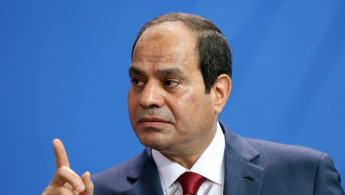Egypt's long-awaited 'national dialogue' to kick off on Wednesday
Egypt's long-awaited "National Dialogue" is set to kick off on Wednesday, almost a year after being initiated by Egyptian President Abdel-Fattah El-Sisi.
The conference will be led by the former head of the Journalists' Syndicate Diayaa Rashwan, known for being loyal to the regime, and will have 19 affiliated committees discussing 113 political, economic and social topics, local state-run Al-Ahram online outlet reported, citing the dialogue's board of trustees.
"It seems that the regime has been stalling for whole a year, hoping that the critical tone could be less severe," a prominent political analyst told The New Arab on condition of anonymity.
Following "the Egyptian Family Iftar" banquet hosted by Sisi in Ramadan last year, he reactivated the operations of the presidential pardons committee in what seemed to be a means to appease the political forces. Most of the committee's members are known to be pro-regime.
The dialogue is expected to gather representatives of all political groups, excluding the Muslim Brotherhood, legally designated a "terrorist" group in Egypt since 2014.
Over the course of a year, participants have met several times to discuss the agenda and procedures. However, they have never held an actual dialogue.
More than 1000 pre-trial detainees have received presidential pardons so far, while only a few convicts were released in the process.
"During the past year, Egyptians were under the impression that detainees were walking free as they probably were unaware of the actual number of prisoners of conscience in the country or those in self-exile compared to the released ones," the analyst said.
"The committee is nothing but a means to an end, a tool to beautify the image of an autocrat…at the end of the day, nothing much will happen. Maybe a few hundred more will be released, and that's it," a professor of political science told TNA.
"Most Egyptians, even those who voted for Sisi, are now disappointed in his performance amid the economic and political conditions, being unable to survive amid an impossible situation," the professor added.
Under Sisi's rule, there has been a crackdown on critics, journalists and activists, which human rights advocates say has placed tens of thousands behind bars.
Sisi has always denied that there are political prisoners in Egypt and says the state is providing rights by promoting economic and social development.





 Follow the Middle East's top stories in English at The New Arab on Google News
Follow the Middle East's top stories in English at The New Arab on Google News


